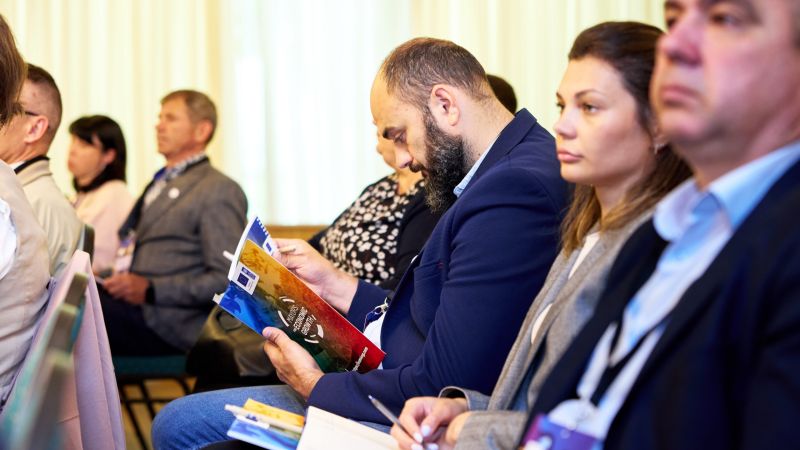
Moldova este printre cele mai avansate țări din Europa de Est la capitolul politicilor demografice axate pe nevoile oamenilor
Datele de calitate și utilizarea acestora ca bază de dovezi pentru elaborarea politicilor sunt esențiale în abordarea provocărilor demografice cu care se confruntă Republica Moldova și pentru asigurarea unei bune guvernări. Aceasta este concluzia participanților și participantelor la conferința internațională privind guvernanța bazată pe date, organizată de Fondul Națiunilor Unite pentru Populație (UNFPA), în parteneriat cu Cancelaria de Stat și PNUD, pe 25-26 martie la Chișinău.
Chiar dacă Republica Moldova are una dintre cele mai ridicate rate de fertilitate din Europa, cu 1,7 copii per femeie, aceasta rămâne sub nivelul necesar pentru menținerea stabilă a numărului populației. Împreună cu emigrarea semnificativă a tinerilor, aceasta contribuie la scăderea constantă a populației. Astfel, dacă în 2019 populația țării era 2684,8 mii persoane, atunci în 2023 populația a ajuns la 2512,8 mii. În același timp, ponderea persoanelor vârstnice a crescut rapid, de la circa 21% în 2019 la 24% în 2023.
„Nu există o soluție imediată pentru a răspunde provocărilor demografice cu care ne confruntăm în regiune”, a declarat în debutul conferinței, Florence Bauer, Directoarea regională UNFPA pentru Europa de Est și Asia Centrală. „Este nevoie de o abordare cuprinzătoare, care să exploreze barierele tinerilor în planificarea viitorului în propria lor țară și dorința de a avea copii. Iată de ce datele de calitate sunt atât de importante – fără acestea, nu vom ști care sunt aceste bariere și ce politici sunt necesare pentru a le elimina”
Conferința de 2 zile cu genericul „Guvernarea bazată pe date pentru politici publice eficiente”, a reunit peste 100 de experți și experte în date statistice și demografie la Chișinău pentru a discuta modalități de generare a datelor statistice de calitate și a prognozelor populației. Datele de calitate și utilizarea lor sunt esențiale pentru dezvoltarea politicilor de atenuare a consecințelor negative ale schimbărilor demografice.
Potrivit Directoarei regionale UNFPA, „Republica Moldova este printre cele mai avansate țări din Europa de Est la capitolul politicilor demografice axate pe oameni și nevoile lor”, a adăugat doamna Bauer.
Începând cu anul 2021, Guvernul Republicii Moldova a adoptat o viziune modernă asupra politicilor demografice, centrată prioritar pe drepturile și nevoile oamenilor și mai puțin pe abordarea îngustă a numărului populației. De atunci, au fost introduse o serie de măsuri pentru a consolida reziliența demografică, inclusiv o nouă legislație pentru extinderea politicilor familiale sensibile la gen în sectoarele public și privat, îmbunătățirea mecanismelor de producere a datelor calitative despre populație, programe de dezvoltare locală cu implicarea diasporei, programe de împuternicire a tinerilor și promovare a îmbătrânirii sănătoase și active prin digitalizare și învățarea pe tot parcursul vieții.
Conferința privind guvernarea datelor a abordat de asemenea utilizarea datelor statistice în contextul parcursului de integrare europeană al Moldovei. Experții au remarcat că Republica Moldova, cu sprijinul UNFPA, al Uniunii Europene, al Guvernului Elveției și al Indiei, a modernizat sistemul statistic național, care și-a sporit capacitățile de a lucra cu statistici privind populația și de a elabora prognoze pentru politicile publice pe termen mediu și lung.
În continuare, sunt necesare eforturi suplimentare din partea autorităților centrale pentru a transfera cunoștințele și experiența la nivel local, astfel încât autoritățile locale să fie informate și capabile să utilizeze datele și resursele existente în planificarea bugetară și în programele lor de dezvoltare locală.
De asemenea, organizatorii au menționat că Recensământul Populației și Locuințelor, care va avea loc în Republica Moldova în perioada 8 aprilie – 7 iulie 2024, va îmbunătăți semnificativ datele disponibile pentru proiecții, planificarea serviciilor și elaborarea politicilor.
Totodată, în curând, în Republica Moldova, vor fi realizate prognoze anuale ale populației, care vor permite guvernului să abordeze complex dinamica populației, intervenind cu politici care răspund realităților zilnice.








